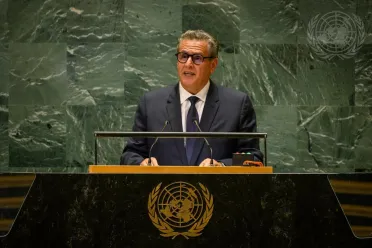Statement
Statement summary
AZIZ AKHANOUCH, Head of Government of Morocco, affirmed his Government’s total support for the Secretary-General’s initiatives to tackle global challenges, including through the Summit. He noted that the collective security once enhanced by the United Nations has given way to uncertainty in many areas — including challenges related to consumption, production, governance, the structure of society and the changing climate. “Climate change has imposed a new reality,” he said, adding that some people question whether multilateralism has run up against its limits in today’s world. Morocco’s diplomatic doctrine remains multilateral at its core as it works to cooperate with its partners and set up effective frameworks. His country, he stressed, aims to tackle security and development challenges at the same time. It does not seek short-term opportunism.
While facing constraints and new challenges, multilateralism needs new momentum and reform, he said. All strata of society can contribute to solutions and the Summit demonstrated the need for all groups, including women and youth, to develop solutions to contemporary problems. The international community must support African States as they are the most affected by the results of climate change, even though they have made minor contributions to it. He also called for creating innovative financing mechanisms to resolve the debt crisis and financial constraints African States face. “And reforms to the international financial architecture are necessary so developing countries can achieve the financing that lets their economies recover,” he said, calling on multilateral financial institutions to develop more flexible financing strategies for these countries. For its part, Morocco, as chair of the Group of Friends of Middle-Income Countries, is aiming to find solutions to help bolster their economies.
Rabat is working to combat terrorism and implement social justice workshops that can help people, he said. It has launched the Atlantic Initiative to give Sahel countries — Burkina Faso, Mali, Niger and Chad — access to the Atlantic Ocean. The Initiative aims to integrate the Sahel region and is a pillar for peace, development and security. Morocco is also working with Nigeria to help many African countries develop. His Government is committed to the peaceful resolution of conflicts, such as in the Moroccan Sahara, and allow for its development. “We support the Secretary-General’s efforts to relaunch the political roundtables to achieve a realistic political solution in the region, based on relevant Council resolutions,” he said.
Turning to the Middle East, he expressed concern with the serious situation impacting the Occupied Palestinian Territory since the end of last year. A solution is needed to achieve peace in Gaza and lasting peace in the region. Morrocco remains in solidarity with Lebanon and respects its territorial integrity. On UN reform, he said the international community must “rethink our working methods,” adding “the United Nations has a collective responsibility and reform is needed as we approach the eightieth anniversary of the Organization.”
Full statement
Read the full statement, in PDF format.
Photo

Previous sessions
Access the statements from previous sessions.
